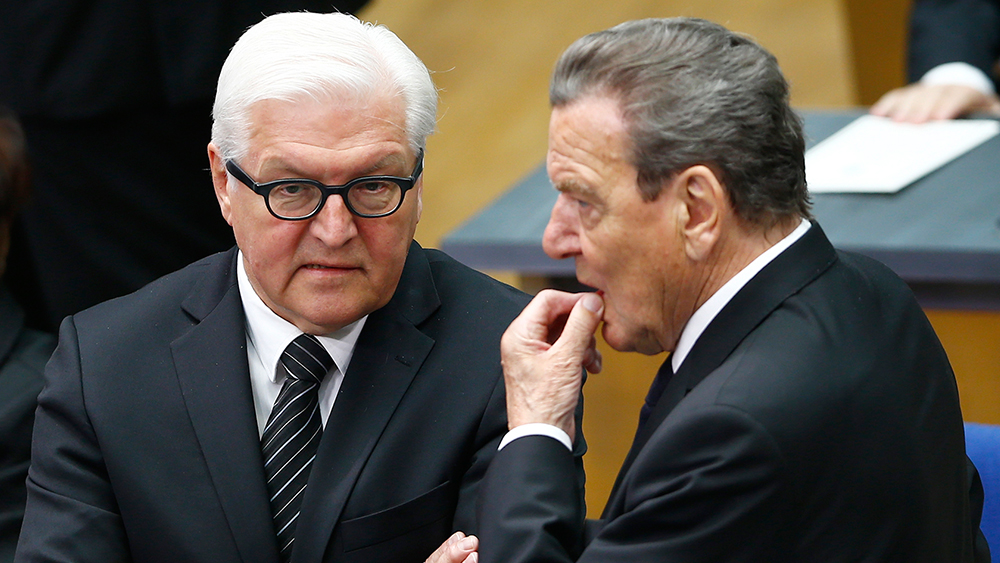Germany’s Foreign Minister Frank-Walter Steinmeier caused consternation when he criticized a NATO exercise long in the making. His party, the SPD, seems to be testing out whether foreign policy could be an election winner.
German Chancellor Angela Merkel is used to surprises. But on the weekend before the Brexit vote, she read a headline that even she did not see coming: her foreign minister, Frank-Walter Steinmeier, complained in a newspaper interview about NATO’s “saber-rattling” and “war cries” on Russia’s border.
The word choice might not have been out of place in a Kremlin press release. But this was Merkel’s top diplomat criticizing a set of long-planned, multilateral military exercises in Poland and the Baltics in which Germany played a leading role. In Berlin, the corridors of power erupted in chatter over Steinmeier’s unexpected remarks just three weeks before a crucial NATO summit.
Colleagues from Steinmeier’s Social Democratic Party (SPD) sprang to his defense, repeating peace mantras from the days of party legend Willy Brandt, who as West German chancellor pushed detente with the Soviet Union through his Ostpolitik. Words of support echoed from the opposition Greens and Left Party. To top things off, news trickled out that Sigmar Gabriel, who wears the hats of vice chancellor, economy minister, and SPD chief, was planning his second trip to see Russian President Vladimir Putin in less than a year.
Merkel, a Christian Democrat (CDU), and Steinmeier, have a curious division of labor in their coalition government: the chancellor sets foreign policy while her foreign minister busies himself with daily diplomacy. Merkel, not Steinmeier, owns the Minsk peace process in eastern Ukraine, and she was the mastermind behind a controversial deal with Turkey on sending back boat people washing up onto Greece’s shores. Steinmeier seems more interested in analyzing how his own ministry works than making bold initiatives.
That is what made Steinmeier’s criticism of NATO so unusual — and indicated that it had more to do with party politicking than a new direction in German foreign policy. The CDU’s junior partner in the second “grand coalition” since 2005, Social Democrats have struggled to be seen as anything more than Merkel’s little helpers. Voters punished the SPD in recent regional elections, and Germany’s storied workersʼ party is now hovering just above the twenty percent-mark in national polls.
Looming Elections
With the next general elections due in September 2017, the most likely way the SPD could break out of the CDU’s embrace is by heading a “red-red-green” coalition with the Left Party and Greens. Cue the SPD’s most popular politician to use Cold War language the party faithful will recognize. According to a recent poll, 58 percent of Germans think Steinmeier would make a good SPD candidate for chancellor next year, while only 31 percent believe the same about party chief Gabriel.
On the surface, Steinmeier’s jab at NATO looks like the handiwork of Gabriel, who is under increasing pressure within the party to start working miracles. But on closer examination, the renewed calls for rapprochement with the Kremlin two years after Russia’s invasion of Ukraine bear the fingerprints of former Chancellor Gerhard Schröder, who still pulls considerable weight inside the SPD. Steinmeier started his political career as an aide to Schröder, then premier of Lower Saxony, and followed him into the Federal Chancellery as chief of staff. Gabriel filled the premier’s seat in Lower Saxony before moving into national politics.
Schröder has largely vanished from public life after reaping scorn for his undying friendship with Putin and his job at Nord Stream, a Russian pipeline project he had advocated as chancellor. But on the same weekend that German tabloid Bild printed Steinmeier’s “saber-rattling” comments, the Munich daily Süddeutsche Zeitung ran a rare interview with Schröder. Seventy-five years after the Nazis’ attack on the Soviet Union, Schröder said, it was a mistake to station additional NATO troops in Eastern Europe. “We Germans have a special responsibility toward Russia,” he said. Willy Brandt’s success in bringing redemption to Germany via Ostpolitik shouldn’t be “gambled away.”
Schröder’s comments are not really surprising; they reflect SPD orthodoxy since 1989. Germany’s Social Democrats have largely attributed the fall of the Berlin Wall to Ostpolitik, which established the economic ties that made the later political transformation of the Soviet bloc possible. Brandt’s contribution was undeniably outsized. But the fact that today’s SPD can only recycle a forty-year-old policy in response to the new challenges posed by Putin’s Russia shows that the party leadership is stuck in the past.
Willful Misreading
Brandt’s legacy is preventing his political heirs from thinking big and new. In a speech delivered in late June, Steinmeier lauded Germany’s ability to understand other nations and questioned why the term Russland-Versteher — someone who understands Russia — had become an insult. It is hard to say whether the foreign minister was being disingenuous or naive. Schröder’s defense of the Kremlin does not stem from any profound knowledge of Russia as much as a willful misreading of the nasty nature of Putin’s regime.
In the speech, Steinmeier called Germany an “honest broker,” basking in a Swiss-style neutrality that was appropriate in the decades after World War II. Russia and Syria have become so difficult to deal with not because other Western powers are unwilling to sit down and talk, but because Moscow and Damascus make no bones about putting military solutions before political ones.
In an article in Foreign Affairs, Steinmeier had the opportunity to tell the world what to expect from Berlin after spending more than a year on an internal review of German foreign policy. Instead, he soberly described the sad state of the world and explained why Germany sees itself as a “reflective power” focused on “restraint, deliberation, and peaceful negotiation.” There’s nothing wrong with Steinmeier’s analysis, it’s just that a German foreign minister should be proposing a plan of action – or, at the very least, a list of priorities.
“Germans do not believe that talking at roundtables solves every problem, but neither do they think that shooting does,” Steinmeier wrote. This kind of binary worldview inevitably forces him to choose “dialogue.” Even more wishy-washy was his conclusion: “Germany will be a responsible, restrained, and reflective leader, guided in chief by its European instincts.”
Steinmeier is wrong: Germany should be guided by human beings of sound mind. The Brexit vote showed that instincts are an unreliable guide, and that the commitment to European ideals is a conscious decision grounded in history and rationality.
Lessons of Brexit
Ironically, Brexit will also make Berlin even more important in determining Europe’s direction as London’s influence evaporates. At the same time, Germany needs the EU more than ever, because without the clout of the 27-member union, it becomes just another middling power.
On Brexit, as on Russia, Steinmeier went his own way without consulting Merkel. The day after the referendum, he invited his colleagues from the five other founding EU member states to Berlin — in line with Schröder’s concept of a “two-speed” Europe. Ignoring the SPD’s calls for a swift British departure from the EU to prevent the Brexit contagion from spreading to other countries, Merkel voiced support for a measured response so as not to hurt one of Germany’s most important trading partners.
The SPD could well take a lesson from British politicians, who by trying to play domestic politics on the back of foreign policy turned a storm in a teacup into an international crisis.
Read more in the Berlin Policy Journal App – July/August 2016 issue.








